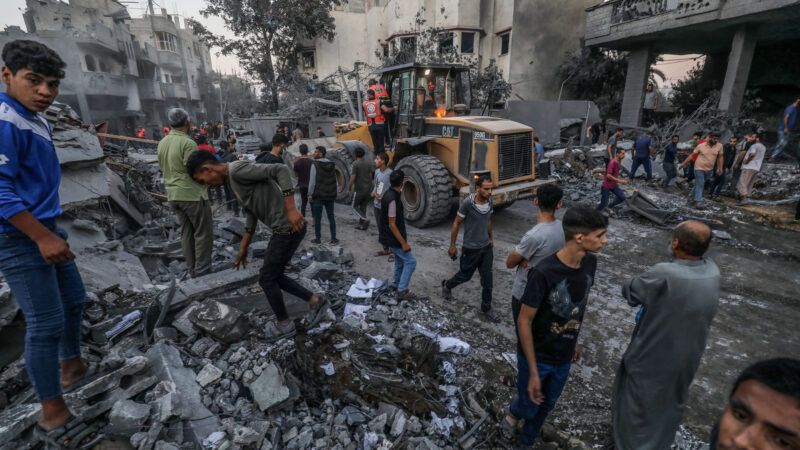Blaming Hamas Shouldn't Mean Ignoring the Palestinians' Plight
Terrorism does not thrive on peace and normalcy. It thrives on war and chaos and overbroad revenge projects.

Who is to blame for the bloodshed in Israel and Gaza?
In one sense, this is a very easy question to answer: Hamas is to blame. This should go without saying, but it has, miserably, become a subject of active conversation thanks to a small but well-placed subset of left-wing activists and students who responded to the initial attack by holding Israel responsible for the violence and loss of life. So let us say it: Hamas is to blame.
Hamas is the explicitly antisemitic terrorist group that began the present conflict on October 7 with a surprise massacre. Hamas is the group that—even if the most horrific accounts, God willing, prove untrue—committed hundreds of war crimes in a span of hours. Hamas is to blame for the deaths of innocents, as yet unknown numbers of infants and children included. Hamas is to blame for kidnapping Israeli civilians and using fellow Palestinians, too, as human shields against Israeli reprisal.
Hamas is to blame for every abduction, every rape, every murder. Hamas is to blame for its deplorable deception, the lie it tells itself and ordinary Palestinians desperate for a champion, that Israeli civilians deserve to die. Hamas is to blame.
And yet if we stop the judgment there, it will be incomplete, and Americans who are old enough to remember the 9/11 attacks—to which the Hamas onslaught has rightly been compared—should know this better than most. We should know, as we learned at the expense of hundreds of thousands of American, Iraqi, and Afghan lives over the subsequent two decades, that terrorism does not happen in a vacuum.
Terrorists do not find a significant constituency in stable, prosperous, reasonably liberal, and democratic places. Terrorist recruitment efforts do not thrive on peace and normalcy, or even narrowly prosecuted retaliation marked by careful avoidance of civilian casualties. They thrive on war and chaos and overbroad revenge projects, like drone wars that label every military-age male a combatant and wipe out whole families, school buildings, hospitals, markets, weddings, and funerals.
They thrive on the conditions routinely suffered by Palestinian civilians in Gaza, where Hamas holds power. In Christianity Today, where I work, a pseudonymous Palestinian Christian explained how the "situation of Gaza was dire even before this war began" because "Gaza is densely populated and very poor. Half the population lives in poverty, and many are unemployed."
Many have observed, correctly, that we must distinguish between Hamas and Palestinians more generally. The millions of Palestinians who live in Gaza—and in Israel, the Palestinian territories, and elsewhere—are not all members or even supporters of Hamas. Around half of the population of Gaza is under 18, which means they were infants, toddlers, or even unborn when Hamas took over Gaza in 2007. This is not a representative government simply doing the will of the people (something even truly democratic governments don't always do).
But it's also not simply a hated local crime syndicate. Hamas is not universally, categorically rejected by Palestinians. Of course, many Palestinians do completely oppose Hamas. But many do not, and only a willful ignorance would refuse to ask why.
A 2021 poll, conducted after a smaller Israel-Hamas war in Gaza, found a slim majority of Palestinians, 53 percent, believed Hamas is "most deserving of representing and leading the Palestinian people." This was a crisis-prompted lurch toward Hamas, pollster Khalil Shikaki told the Associated Press, likely to prove short-lived as Hamas failed to materially improve Palestinians' lives. Still, that number is not a wild outlier. Another poll by Shikaki's organization, conducted this past summer, found 52 percent Palestinian support for armed resistance to Israel.
As the Palestinian Christian writer mentioned above observed, "The poisonous plant of Hamas has been able to take root in our soil." And why? Significantly "because of conditions fostered by a flawed approach to Palestinians from the Israeli government."
That phrase—a "flawed approach"—will almost certainly be an understatement about the Israeli military retaliation for Hamas's monstrous attack. Heading into this past weekend, 1 million civilian Palestinians in Gaza were warned to flee ahead of an Israeli ground incursion. But how can they flee? Where will they go? Borders are sealed. Gaza is small. Again, about half the population is children. People are moving, but their options are limited.
A Reuters report published Thursday told the story of a 31-year-old Palestinian man named Ala al-Kafarneh. He fled his home "with his pregnant wife, his father, brothers, cousins, and in-laws," first to a coastal refugee camp, then elsewhere, after Israeli airstrikes hit around the camp. "On Tuesday night, an airstrike hit the building where Kafarneh and his family were sheltering, killing all of them except him."
Kafarneh's position is unfathomable—a pregnant wife and unborn child, dead and recorded, nameless, in the list of family casualties. Would it surprise anyone if he turns to violence now?
That is not to say he would be justified in seeking a violent revenge. To say that is to take a step toward moral madness, toward a cycle of escalation and chaos, not justice, mercy, or any other good. But it is to say that violence, by its nature, tends to spread. Once loose, it overruns moral boundaries and bends our souls into grotesque shapes. We are each responsible for the violence we commit, each to blame for the wrong we do, each apt to respond to evil with evil. Blood is on the hands that shed it, but it tends to spill all over.


Show Comments (381)